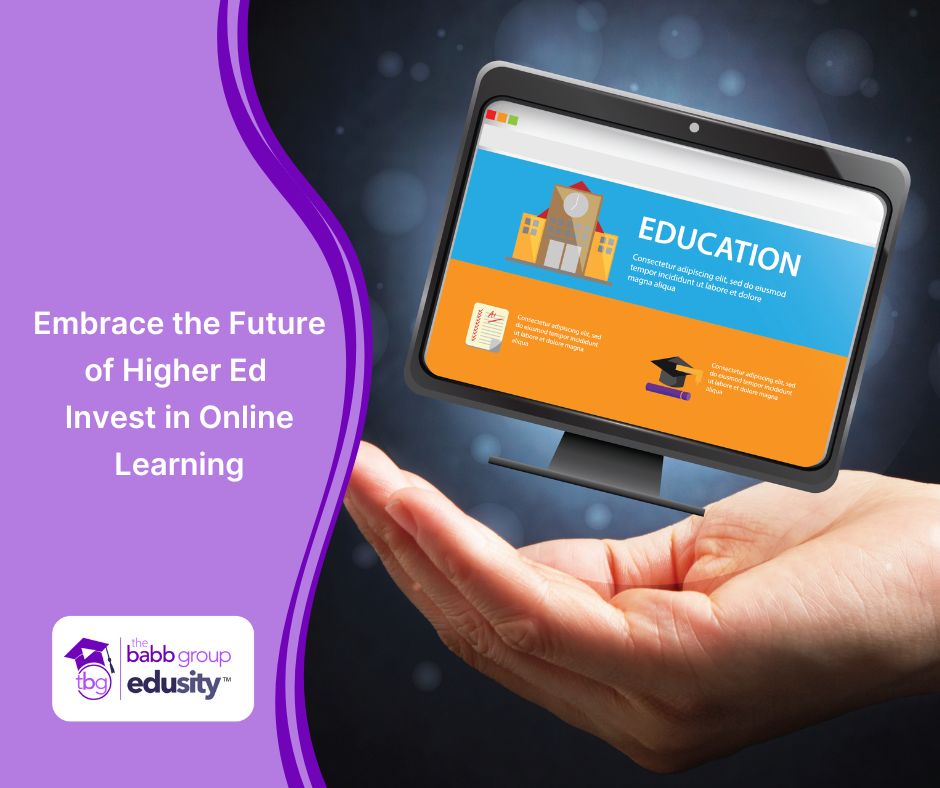The shift towards online learning, once a response to unexpected challenges, is now an opportunity higher ed cannot ignore. According to the eighth Changing Landscape of Online Education (CHLOE) report from Eduventures and Quality Matters, over two-thirds of the 317 colleges surveyed say they are reexamining their strategies to adapt to the growing demand for online learning. Another 39% of respondents said shifting to online is already consistent with their priorities.
The Babb Group’s COO Sheila Fry notes that the CHLOE report confirms what many in higher ed already know. “For many in education–especially higher education–this information is not new. But it emphasizes that we need to be asking new questions. Is your institution positioned to capitalize on the demand for online? Does your program have the depth of content in a high-quality format or are you still offering your online courses in the same layout as you did during Covid? If so, you are missing countless opportunities to improve your programs’ success and get your enrollment back on track.”
Students are demanding increased flexibility, more learning options, engaging experiences, and accessibility, which all come with online education. According to the report, “Nearly 60% of COOs reported that students are satisfied with their online course experience,” compared to 54% positive satisfaction with in-person courses.
Thoughtful Instructional Design and Planning
The CHLOE report emphasizes that effective online learning experiences are not about replicating traditional classroom methods. Instead, educators and instructional designers need to leverage the unique strengths of the virtual classroom. 41% of respondents said creating fully online equivalents of existing F2F courses was their number one priority.
The report indicates several challenges. The first is that 49% of the COOs reported that only a small proportion of full-time faculty have experience designing online courses. Instructional designers can fill the design gaps and support faculty as they understand how to incorporate innovative strategies such as virtual simulations, multimedia resources, asynchronous discussions, and developing mobile learning and employability skills. Using these tools can keep accessibility and Universal Design for Learning principles at the forefront providing all learners with opportunities to succeed.
A second challenge is online courses are filling up faster with F2F students. Schools can use master course shells to easily create more sections and use well-trained, experienced online adjunct faculty to teach them.
Empowering Faculty for the Digital Frontier
For many faculty, moving online was an emergency without time to plan for pedagogy, andragogy, and what makes sense for online learning. It’s essential for the success of students and online programs that faculty are trained in best practices for online teaching. The CHLOE report indicates that 54% of COOs say formal training is required for faculty to teach online. Still, less than half have a high percentage of their FT faculty approved to teach online.
Faculty who undergo rigorous training are better prepared to harness digital tools, engage with online pedagogies, and create dynamic virtual classrooms. A proactive approach enhances the overall quality of education and increases student satisfaction and engagement, leading to higher retention rates.
Training Students with Orientations to Online Classrooms
The CHLOE report underscores the significance of student orientations in the successful transition to online learning. Most respondents say their school provides some format of orientation to online learning. Still, only some require students to complete the course before they start an online course. Orientations often focus on technical, administrative, and academic services.
Like the first day of traditional school, where students find their classrooms and navigate new buildings, students need to know where to find their learning tools in online classrooms. Orienting them to the online classroom helps them focus on content instead of overcoming technology barriers. These orientations introduce students to their learning management system, links, and where to find resources and assignments. Orientations often include essential skills for effective online study. Giving students a classroom map removes the first-day hunt for resources, ultimately leading to improved academic outcomes.
Stay up on current trends in higher ed with The Babb Group’s monthly newsletter.
A Win-Win for Institutions and Learners
The CHLOE report paints a compelling picture of the strategic advantages of embracing online learning for higher education institutions. Institutions offering online programs reported that their online initiatives have led to increased enrollment, reflecting the expanded reach and accessibility of virtual education.
The insights from the CHLOE report demonstrate we can stem the trend of dropping enrollment and continue offering education solutions to all learners. Higher ed can truly serve students by investing in well-developed online courses, instructional design, faculty training, and student orientations.
Angela Britcher
Latest posts by Angela Britcher (see all)
- Enhancing First-Year Experiences in Higher Education - August 1, 2024
- Enhancing Education with Virtual Reality: A Hands-On Approach - June 27, 2024
- Higher Education Trends: Insights from Our COO, Sheila Fry - June 13, 2024
